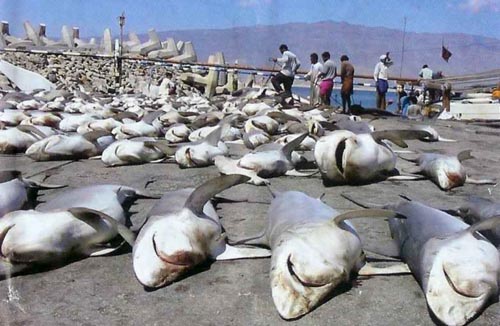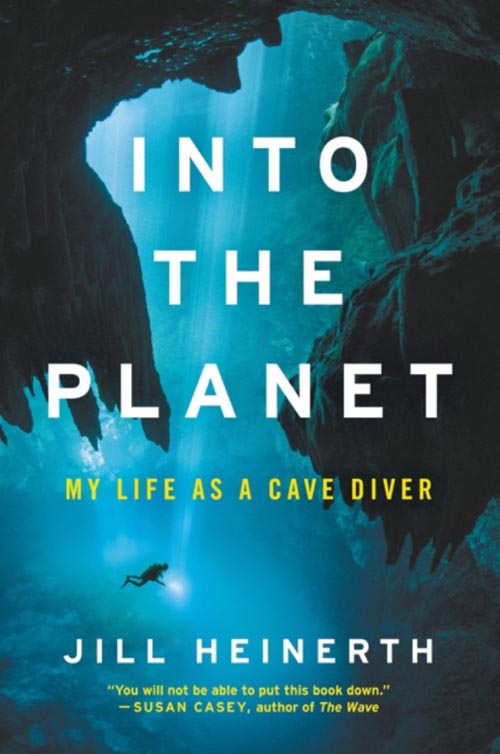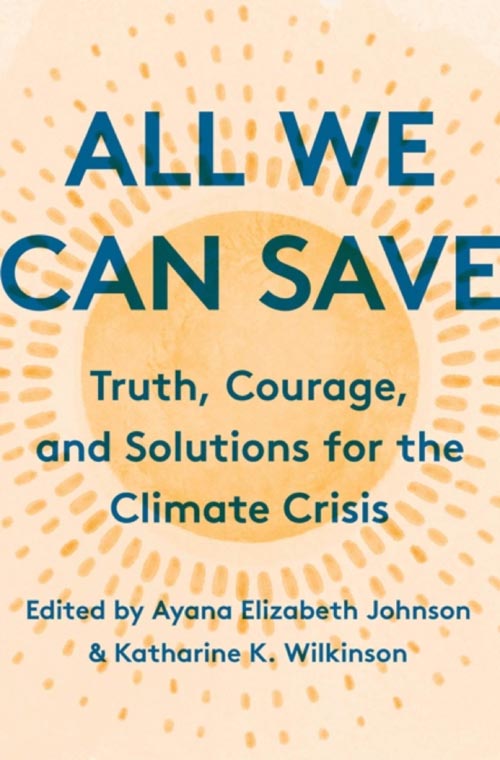 | | |  In the last few months, millions of Americans have spent weekends and vacation days on the beaches and coasts, trying to escape record-breaking temperatures nation-wide. Many of these vacationers are starting to see what’s really going on in our oceans in the news and scientific reports. Shark Week this year highlighted the magnificence and power of sharks but failed to address the mass slaughter of sharks happening daily. By July, more manatees had died than in any previous year. Scientist reported that emperor penguin colonies are “doomed for extinction.” In the last few months, millions of Americans have spent weekends and vacation days on the beaches and coasts, trying to escape record-breaking temperatures nation-wide. Many of these vacationers are starting to see what’s really going on in our oceans in the news and scientific reports. Shark Week this year highlighted the magnificence and power of sharks but failed to address the mass slaughter of sharks happening daily. By July, more manatees had died than in any previous year. Scientist reported that emperor penguin colonies are “doomed for extinction.” But lawmakers and ocean activists alike are making progress in the fight for stronger marine conservation and ocean climate resilience. This month in the halls of Congress, legislators pushed bills to stop devastating shark finning, ban imports of fish tied to illegal labor practices, and add 16,000 acres of ocean to protect orcas. Cities from New York to Miami to Houston are crafting infrastructure and urban planning proposals to avoid the worst impacts of sea level rise and coastal degradation, and the federal infrastructure bill includes funding to support these efforts. The release of the IPCC (Intergovernmental Panel on Climate Change) Climate Report has spurred the public to call on world leaders to set more aggressive carbon emissions targets; the oceans specific IPCC report has the potential to push forward ocean climate resiliency efforts when it’s released in the coming months. The public is waking up to the crises happening in the ocean and demanding action. | | | | | | | | Marine life is under attack: toxic algae blooms, speeding ships,
and warming seas speed up extinction for ocean species | | | | | | Toxic Algae Bloom on Florida Coast Revenges Wildlife: "This is an absolute nightmare" Beaches near Tampa have been littered with dead sea creatures, killed by a massive algae bloom that marine scientists say has been worsened by pollution. Tyler Capella, who runs a fishing charter business, took CBS News out on Tampa Bay to see what he calls his nightmare. Dead fish are everywhere, killed by a red tide that has turned Tampa Bay toxic. "This just goes forever," Capella said. "It's devastating. My worst fears have come true. I mean, this is an absolute nightmare." | | | | | | 50% of Salt Marshes at Risk of Destruction, Gullah/Geechee Nation Fights Back A new study has found that half of the nation’s tidal marshes are at risk of being destroyed by sea-level rise, most of them along the southern coasts of the contiguous U.S. Now, members of the Gullah/Geechee Nation, whose one million residents live along coastal areas stretching from Jacksonville, North Carolina, to Jacksonville, Florida, are fighting to preserve these critical habitats and the cultural value they’ve provided for generations. | | | | | | More Manatees Have Died So Far in 2021 Than in Any Previous Entire Year Nature is certainly not healing — at least not in Florida, where manatees are dying at unusual and alarming rates. This month, the Florida Fish and Wildlife Commission (FWC) reported 866 manatee deaths so far in 2021 — the highest death toll ever recorded in a single year. And it's only July. In 2020, a total of 377 manatee deaths were recorded. It was 366 in 2019. For the past five years, the annual average of manatee mortality was 375. | | | | | | Virtually All Emperor Penguin Colonies Doomed For Extinction by 2100 as climate - Change Looms, Study Finds Nearly all of the world’s emperor penguin colonies may be pushed to the brink of extinction by 2100, a study has found, as the United States moves to list them as threatened under the Endangered Species Act. If climate change continues at its current rate, more than 98 percent of emperor penguin colonies are expected to become quasi-extinct by the turn of the century, a group of global researchers wrote in the journal Global Change Biology on Tuesday | | | | | | Growing “Dead Zone” Off Oregon Coast Worries Scientists and Fisherman Alike This explosive new documentary film about the fragile state of the ocean is grabbing attention – it even made the British edition of Vogue Magazine. In the last week since its release, it has vaulted into the top ten most-streamed films on Netflix. It has also caused quite a stir — you can read more about that here and here. One of the main messages of the film is that we humans should switch to a plant-based diet because overfishing by humans is “killing the ocean.” Overfishing is quite a problem globally — especially the illegal kind that we often write about here in ODP. But for millions of people, fish are an essential source of protein for which there is no substitute. | | | | | | Something is Killing Grey whales. Is it a Sign of Oceans in Peril? For thousands of years, gray whales have taken the longest annual migration of any mammal, starting in the arctic, down the California coast to find refuge along Mexico’s Baja peninsula. But a couple years ago, their migration took a fatal turn, as bodies of California gray whales began washing ashore. L.A. Times investigative environmental reporter Susanne Rust and photographer Carolyn Cole traveled up and down the coast to learn moreabout our changing oceans and the devastating byproduct. | | | | | | The Whales Aren't Alright Gray whales have been dying off the coast of California, and scientists are trying to figure out exactly why. From 2019 through this summer, 69 whales have stranded on California beaches of nearly 500 total along the North American coast from Mexico to Alaska. The National Oceanic and Atmospheric Administration (NOAA) has declared it an “unusual mortality event.” The answer to why is still unclear, but as the LA Times reports, a number of human factors are likely at play, including climate change warming the ocean and disrupting their food supply and an increase in shipping traffic leading to deadly strikes and underwater noise. | | | | | | | | Microplastics, the 'big little' Problem Plaguing the Oceans Microplastics are everywhere. “It’s in our water, it’s in the ocean, it’s in the animals, in the air, even in space,” Ana Zivanovic-Nenadovic, North Carolina Coastal Federation assistant director of policy, said recently during a virtual forum on microplastics. Since the mass production of plastics began in the mid-20th century, plastic has permeated our lives, she explained to the 202 from 29 different counties logged on for the North Carolina Coastal Microplastics Forum, organized by the federation. | | | | | | Whale Poop and Phytoplankton, the Dynamic Duo Fighting Climate Change We all poop. Worms do it, cows do it, humans do it—it’s a fact of life. But did you know that some poop matters more than others? Out of all the animal poop on earth, whale poop takes home the gold every time, and for a very special reason. No matter where you live—the valleys of the Himalayas, the Melbourne coastline, or the landlocked prairies of Kentucky—more than 50% of the air you breathe is produced by the ocean. More specifically, it’s thanks to little marine organisms called phytoplankton and the marvels of whale poop. | | | | | | Detergent Pods May Release Microplastics Into the Environment Despite Sustainability Claims Though most reasonable people abstained from the 2018 viral Tide Pod Challenge, it turns out the public may be unwittingly consuming the candy-like detergent pods anyway. A new study has found that up to 75% of plastics from detergent pods end up in the environment despite claims by manufacturers that the pods are biodegradable. Researchers say that a chemical used in the manufacturing of the pods, polyvinyl alcohol (PVA), can enter groundwater and contaminate the food chain if not adequately mitigated. | | | | | | You Eat Microplastics Every Day. Here's What They May Be Doing in Your Body Plastics are everywhere, and as useful as they are, all kinds of experts are concerned about their impact. The plastic waste that gets dumped in the ocean may be affecting ocean life. Not only that, microplastics could be ingested by humans and animals alike. By one estimate, you could be eating 5 grams of plastic each week. And we’re only just starting to learn how they could affect our bodies. In a study published last week in the Proceedings of the National Academy of Sciences, researchers exposed cells in a laboratory setting to microplastics ranging in size from 1 to 10 micrometers. | | | | | | Baby Turtles Are Full of Plastic, Study Finds. Here’s Why — and What Effect it Has After baby turtles hatch, they wait until night before making the journey from their shells to the water to avoid predators. But there’s another danger lurking in the water. And it’s one turtles haven’t adapted to yet. Millions of tons of plastic debris pours into the oceans every year where marine life often mistake it for food. These plastics come from items like plastic grocery bags or synthetic textiles and from fishing gear like ropes and nets. | | | | | | ‘Build Back Better’? America’s infrastructure plan is incomplete without coastal climate resiliency and carbon-free ocean energy | | | | Lack of Infrastructure to Hinder Biden's 2030 Offshore Wind Targets Although the US market for offshore wind energy will grow thanks to a number of factors including supportive regulation through 2030, the sector is likely to miss the target set by President Biden, according to a new report released by IHS Markit. The lack of infrastructure and other bottlenecks are likely to prevent the US market for offshore wind energy to hit the 30GW target set by the president, states IHS Markit. | | | | | | Climate Infrastructure Bill: A Substantial Investment in Resilience As the United States staggers through another year of devastating wildfires, drought, storms and other calamities, the infrastructure bill before Congress would pour major resources into a response. The measure agreed to over the weekend includes billions of dollars to better prepare the country for the effects of global warming, in what could be the largest investment in climate resilience in American history. Much of the money would go toward activities that are already underway, but which experts say the government needs to do more of as the threats from climate change increase. | | | | | | Louisiana needs Sand to Rebuild Its Coast. Old Oil and Gas Pipelines Are Blocking the Way A Houston-based energy company is asking a federal bankruptcy court for permission to walk away from its aging infrastructure in the Gulf of Mexico. Fieldwood Energy is attempting to shift responsibility for removing 1,715 wells, 276 platforms and 281 pipelines to oil and gas companies that previously held leases for the same area, according to court documents. Under existing federal regulations, companies remain liable for decommissioning infrastructure on areas of federally owned seafloor where they previously produced oil and gas. | | | | | | On South Carolina’s Shore, Some Condo Owners Worry: Are Their Buildings Safe? When Mark and Judy Rondeau moved to a condominium five years ago, they did everything they could to protect their investment in this damp, flood-prone state. They hired a home inspector to closely scrutinize the appliances, interior walls and ceilings. They spent hours researching the last time Buck Creek, located about a half-mile from their building, experienced a major flood. And they bought extra insurance, even though their well-financed condominium association had a policy that extended to unit owners. | | | | | | New Jersey Has the Wind in its Sails The Garden State is getting more offshore wind — enough to power 1.15 million homes. The New Jersey Board of Public Utilities voted unanimously at the end of June to approve the state’s second offshore wind project, a decision that puts New Jersey just behind New York among states with the most approved offshore wind energy. Two developers, Atlantic Shores Offshore Wind and Ocean Wind 2, a subsidiary of the Danish wind giant Ørsted, will produce 2,658 megawatts of power off the coast near Atlantic City. | | | | | | Coastal Communities Saw Record-setting High-tide Flooding in Past Year: NOAA Coastal communities in the U.S. saw record-setting high-tide flooding in the past year and this trend will likely continue unless flood defenses are improved upon, the National Oceanic and Atmospheric Administration (NOAA) said Wednesday. The agency looked at high-tide flooding patterns from May 2020 to April 2021 based off its 97 tide gauges found along the U.S. coast. High-tide flooding, which occurs when tides reach 1.75 to 2 feet above the daily average high tide and start spilling onto streets or bubbling up from storm drains, has become increasingly common as sea levels ris. | | | | | | Coral Reefs Prevent Over $1.8 B Every Year in US Flood Damage Coral reefs provide a home to so many different creatures that they’re sometimes called “rainforests of the sea.” And near the shore, they help absorb wave energy. So as extreme storms grow more common, coral reefs help protect coastal communities from flooding and storm surge. “Coral reefs provide critical coastal protection benefits,” says Borja Reguero of the Institute of Marine Sciences at the University of California, Santa Cruz. | | | | | | The ‘World’s Most Powerful Tidal Turbine’ Starts to Export Power to the Grid A tidal turbine weighing 680 metric tons and dubbed “the world’s most powerful” has started grid-connected power generation at the European Marine Energy Centre in Orkney, an archipelago located north of mainland Scotland. The news marks another major step forward for the U.K.’s nascent marine energy sector. In an announcement Wednesday, Scottish engineering firm Orbital Marine Power explained how its 2 megawatt O2 turbine had been anchored in a body of water called the Fall of Warness, with a subsea cable linking it to a local electricity network on land. | | | | | |  | | | | | Once again this year, Shark Week drew viewers to TV shows and movies that exaggerate the danger of sharks. WE are the danger, not sharks. Shark attacks result in less than 10 fatalities per year. Humans kill about 275,000 sharks EVERY DAY. Most of these sharks are gruesomely killed by severing their top fin and throwing their bodies back into the ocean to bleed out, be eaten, or drown. The fins are then traded legally and illegally across the world. YOU can help the US stop its support of this devastating trade. CLICK HERE to save our sharks! | | | | | | On average, offshore drilling operations spill 157,000 barrels of oil every year. That equals 10 Olympic swimming pools of oil ruining our ocean ecosystems every year. In 2005, Hurricane Katrina and Rita alone caused nine spills with 4.8 million gallons of oil. In 2010, the Deepwater Horizon oil spill released 4.9 million barrels into the Gulf of Mexico. Fossil fuel drilling operations kill wildlife, pollute waters, and destroy our ecosystems. It is long past time to transition from fossil fuels to renewables, but we can't do that unless we stop oil and gas drilling! Permanently. Take action HERE! | | | | | | These iconic birds must eat to survive. But with less and less forage fish in the ocean, they often cannot find enough food. Forage fish are small fish relied on by puffins and other predators, but overfishing is exacerbating their population collapse. No forage fish, no food. Some Atlantic Puffin colonies have decreased by 80% since the 1970s because of a lack of prey. We must act now, or these beloved birds will continue to go hungry. Urge your Senators to support the Forage Fish Conservation Act today (S.1484)! Take Action HERE | | | | | | | |  | | | |  In her life retrospective, explorer Jill Heinerth takes readers into the blue depths of the world’s most dangerous underwater caves where she has made her career. As a diver, filmmaker, and writer, Heinerth’s memoir resonates with anyone who has a love for the ocean and craves adventure and exploration. Her stories from the deep will leave readers with chills as they vicariously experience Heinerth’s many close brushes with deaths. In her life retrospective, explorer Jill Heinerth takes readers into the blue depths of the world’s most dangerous underwater caves where she has made her career. As a diver, filmmaker, and writer, Heinerth’s memoir resonates with anyone who has a love for the ocean and craves adventure and exploration. Her stories from the deep will leave readers with chills as they vicariously experience Heinerth’s many close brushes with deaths.
As she recounts her explorations, Heinerth unpacks our primal, human relationship with the ocean as both the origin and giver of life as well as for many a deadly, cold grave. Aside from the diving accounts and inspiring tales of bravery, Into the Planet will call on readers to think of themselves as adventurers, explorers in their everyday lives. Heinerth answered the call to adventure into the deep sea, but we all have the potential to carve new, bold paths through life to leave this world a better place.
Explorers, what are you waiting for? Dive into this thrilling read. | | | | | | | | |  Deadly heat waves, record breaking temperatures, ravenous forest fires, rising seas… it’s no wonder that every news source is flooded with articles on climate anxiety. Scientific reporting—like the 2021 IPCC report released this August—plays a critical role in informing and influencing the public, inspiring climate action. However, these reports cannot comprehensively reflect the human impact of the climate crisis. Deadly heat waves, record breaking temperatures, ravenous forest fires, rising seas… it’s no wonder that every news source is flooded with articles on climate anxiety. Scientific reporting—like the 2021 IPCC report released this August—plays a critical role in informing and influencing the public, inspiring climate action. However, these reports cannot comprehensively reflect the human impact of the climate crisis.
All We Can Save—edited and complied by Dr. Ayana Elizabeth Johnson and Katharine K. Wilkinson—brings together 50 poems and essays from female thought leaders in the climate arena, ranging from oceanographers to artists to lawyers. As Rolling Stone reported, “Taken together, the breadth of their voices forms a mosaic that honors the complexity of the climate crisis like few, if any, books on the topic have done yet.”
All We Can Save is a must read for anyone living through the climate crisis with their eyes open. | | | | | | | | | | |  Ba-dum… bad-dum… ba-dum ba-dum ba-dum…BADADA! The classic, shocking imagery of Steven Spielberg’s Jaws has left a lasting impression on the public, painting sharks as monstrous killers lurking in the deep sea. In reality, shark populations around the world are suffering as shark finning, warming waters, and reckless fishing practices kill millions of sharks every week. The Beyond Jaws Podcast aims to un-do the public reputation of sharks created by popular culture and get to the heart of what’s going on with the oceans’ most precious predators. Tune in to learn about the science of sharks and the conservation efforts fighting to save them. Ba-dum… bad-dum… ba-dum ba-dum ba-dum…BADADA! The classic, shocking imagery of Steven Spielberg’s Jaws has left a lasting impression on the public, painting sharks as monstrous killers lurking in the deep sea. In reality, shark populations around the world are suffering as shark finning, warming waters, and reckless fishing practices kill millions of sharks every week. The Beyond Jaws Podcast aims to un-do the public reputation of sharks created by popular culture and get to the heart of what’s going on with the oceans’ most precious predators. Tune in to learn about the science of sharks and the conservation efforts fighting to save them. | | | | | | | | | |  Audrey Magnuson, RCC Presidential Fellow Audrey Magnuson, RCC Presidential Fellow
Audrey Magnuson co-leads RCC’s Coasts and Ocean program and works on environmental justice and policy. She is a rising senior at Duke University majoring in Public Policy with minors in Environmental Science and Art History. audrey.magnuson@duke.edu | | | | | |  The Rachel Carson Council Depends on Tax-deductible Gifts From Concerned Individuals Like You. Please Help If You can. The Rachel Carson Council Depends on Tax-deductible Gifts From Concerned Individuals Like You. Please Help If You can. | | | |  Sign Up Here to Receive the RCC E-News and Other RCC Newsletters, Information and Alerts. Sign Up Here to Receive the RCC E-News and Other RCC Newsletters, Information and Alerts. | | | | | | | | | | | |